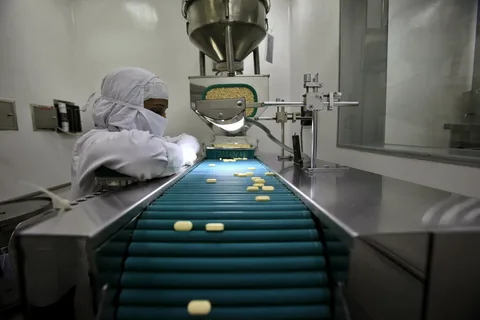Introduction
In the pharmaceutical industry, the convergence of artificial intelligence (AI) and drug manufacturing is ushering in a new era of innovation and efficiency. The application of AI technologies, including machine learning and data analytics, is transforming the drug manufacturing process from research and development to production. This article explores the vast potential of AI in drug manufacturing, examining its impact on drug discovery, production optimization, quality control, and the future trajectory of pharmaceutical manufacturing.
AI in Drug Discovery
The drug discovery process, traditionally a lengthy and resource-intensive endeavor, is experiencing a revolution with the integration of AI. Machine learning algorithms analyze vast datasets of biological information, chemical properties, and clinical outcomes to identify potential drug candidates. AI accelerates the identification of promising compounds, significantly reducing the time and cost involved in the early stages of drug development.
Optimizing Formulation and Process Development
AI plays a crucial role in optimizing drug formulation and manufacturing processes. By analyzing complex interactions between raw materials, processing conditions, and the final product characteristics, AI models can identify optimal formulations and manufacturing parameters. This leads to improved drug quality, enhanced process efficiency, and a reduction in production costs.
Predictive Maintenance and Quality Control
In pharmaceutical manufacturing, maintaining equipment in optimal condition is vital to ensure product quality and regulatory compliance. AI-driven predictive maintenance utilizes sensor data and machine learning algorithms to predict equipment failures before they occur. This proactive approach minimizes downtime, reduces the risk of defects, and enhances overall quality control in drug manufacturing.
Supply Chain Optimization
The pharmaceutical supply chain is complex, involving multiple stakeholders and intricate logistics. AI contributes to the optimization of the supply chain by predicting demand, managing inventory levels, and identifying potential disruptions. This not only ensures the availability of raw materials but also facilitates a more responsive and adaptive manufacturing process.
Personalized Medicine and Batch Production
As the concept of personalized medicine gains prominence, AI is instrumental in adapting drug manufacturing to individual patient needs. AI models analyze patient data to tailor drug formulations and production processes, enabling batch production that aligns with specific patient requirements. This shift towards personalized medicine has the potential to enhance treatment efficacy and reduce adverse effects.
Challenges and Considerations
While the potential of AI in drug manufacturing is immense, challenges and considerations exist:
Data Privacy and Security: The utilization of vast amounts of sensitive patient data raises concerns about data privacy and security. Ensuring robust data protection measures is crucial to maintain trust in the use of AI in drug manufacturing.
Regulatory Compliance: The pharmaceutical industry is highly regulated. Adapting to regulatory frameworks that accommodate the dynamic nature of AI technologies requires collaboration between industry stakeholders and regulatory authorities.
Integration with Legacy Systems: Many pharmaceutical manufacturing facilities operate with legacy systems. Integrating AI technologies seamlessly with existing infrastructure poses challenges that need to be addressed for widespread adoption.
Interdisciplinary Collaboration: Successful implementation of AI in drug manufacturing requires collaboration between data scientists, engineers, chemists, and regulatory experts. Interdisciplinary teams must work cohesively to navigate the complexities of the pharmaceutical industry.
The Future Trajectory of AI in Drug Manufacturing
The evolution of AI in drug manufacturing is poised to shape the future of pharmaceutical development and production:
Generative Chemistry: AI-driven generative chemistry models will continue to evolve, assisting researchers in designing novel drug candidates with enhanced specificity and efficacy.
Autonomous Manufacturing: The concept of autonomous manufacturing, where AI systems manage and optimize the entire drug production process, holds the potential to revolutionize efficiency and responsiveness in pharmaceutical manufacturing.
Advanced Robotics and Automation: The integration of advanced robotics and automation, guided by AI algorithms, will enhance precision and speed in tasks such as sample handling, quality control, and packaging.
Real-time Process Monitoring: AI-enabled real-time monitoring of manufacturing processes will become more sophisticated, allowing for immediate adjustments to ensure consistent product quality and compliance.
Global Collaboration and Knowledge Sharing: AI technologies will facilitate global collaboration and knowledge sharing among pharmaceutical researchers and manufacturers, accelerating the pace of drug discovery and development.
Conclusion
The potential of AI in drug manufacturing represents a transformative force in the pharmaceutical industry. From expediting drug discovery to optimizing production processes and ensuring quality control, AI technologies offer a multifaceted approach to enhancing efficiency and innovation. As the field continues to evolve, addressing challenges and
FAQs
How does AI contribute to drug discovery?
AI, particularly machine learning algorithms, analyzes vast datasets to identify potential drug candidates, accelerating the early stages of drug development.
What role does AI play in optimizing drug formulation and manufacturing processes?
AI analyzes interactions between raw materials, processing conditions, and final product characteristics to identify optimal formulations and manufacturing parameters, improving drug quality and process efficiency.
How does AI contribute to predictive maintenance in pharmaceutical manufacturing?
AI-driven predictive maintenance uses sensor data and machine learning algorithms to predict equipment failures before they occur, minimizing downtime and enhancing quality control.
How does AI optimize the pharmaceutical supply chain?
AI predicts demand, manages inventory levels, and identifies potential disruptions, optimizing the pharmaceutical supply chain for enhanced responsiveness and efficiency.
What is the future trajectory of AI in drug manufacturing?
The future involves advancements in generative chemistry, autonomous manufacturing, advanced robotics and automation, real-time process monitoring, and global collaboration facilitated by AI technologies in the pharmaceutical industry.
